Employment & the Economy
Recent Activity
This paper intends to provide a baseline of evidence for policymakers seeking to calibrate their immigration policy responses to the economic downturn, with a focus on the UK.
Public opinion supports the view that immigrants take natives’ jobs and reduce their wages, but most economists disagree. Although basic laws of supply and demand suggest that immigration could reduce wages by increasing the supply of workers, in reality the actual impact of immigration is likely to be small, especially in the long run.
The global recession’s deepening effects on governments, public and private institutions, and individuals is increasingly taking center stage for migration policy stakeholders at both source and destination countries.
This report seeks to understand and predict the potential impact of the economic crisis that began in December 2007 on legal and illegal immigration flows to and from the United States, and the likely effects of an economic downturn on the labor market performance of immigrants.
This short briefing paper explores the potential effects of the economic crisis with respect to immigration across European Union Member States, and outlines how policymakers might respond to changing patterns of migrant inflows and outflows, and the consequences of the downturn on immigrants and their host communities.
This report looks at E-Verify, the Internet-based employment verification program operated by the Department of Homeland Security in partnership with the Social Security Administration. The program gives employers a means to electronically verify the work eligibility of newly hired employees.
This report explores the need for nations to adjust their thinking and policy toward attracting the coveted elite class of highly skilled global talent as emerging and middle-income countries increasingly attempt to woo back their nationals and engage their diaspora to help move their economy forward.






